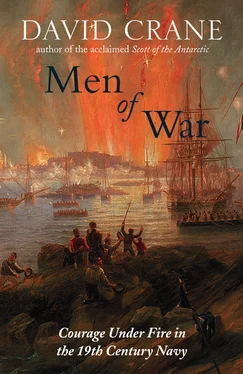1 ...6 7 8 10 11 12 ...33 As the ship slipped into those atavistic rhythms that no one who witnessed them ever forgot, and hammocks were stowed, cutlasses and muskets distributed, powder horns and spare flintlocks issued, magazines and powder rooms unlocked, operating area prepared, and final letters written, full sail was set and Neptune strove to take her place in the line. In Nelson’s original battle plan Fremantle had been ordered to follow Temeraire , Superb and Victory in the weather division, but with only the short October day ahead of them, and speed crucial if the enemy were not to escape, precedence went out of the window in favour of an ad hoc order that left the two columns to sort themselves out, as sailing capacities dictated, behind Victory and the Royal Sovereign .
It was now that the ‘old Neptune , which never was a good sailer’, as William Badcock put it, ‘took it into her head to sail better that morning than I ever remembered’, and at about 10 a.m. she came up alongside Nelson’s Victory . Fremantle intended to ‘pass her and break the enemy’s line’, Badcock recalled, ‘but poor Lord Nelson hailed us from the stern-walk of the Victory , and said, “ Neptune , take in your studding-sails and drop astern; I shall break the line myself.”’
It was probably the eleven-year-old Hastings’s sole glimpse of Nelson, but if he ever wondered what it was that gave him his unique hold over men, he did not have long to wait for an answer. As Neptune dropped astern of Victory , and the Temeraire slipped between them to take her place in the van, Nelson’s last signal before the order to ‘engage’ was relayed through the fleet. ‘At 11,’ the Neptune ’s log laconically noted, ‘Answered the general signal, “England expects every man will do his duty”; Captain Fremantle inspected the different decks, and made known the above signal, which was received with cheers.’
He ‘addressed us at our Different Quarters in words few’, James Martin remembered, ‘but Intimated that … all that was Dear to us Hung upon a Ballance and their Happyness depended upon us and their safty allso Happy the Man who Boldly Venture his Life in such a Cause if he shold Survive the Battle how Sweet will be the Recolection be [sic] and if he fall he fall Covred with Glory and Honnor and Morned By a Greatfull Country the Brave Live Gloryous and Lemented Die.’
In the heavy swell and light winds – and to the sounds of ‘Rule Britannia’ and ‘Britons Strike Home’ drifting across the water from ships’ bands – Neptune closed on the enemy with agonising slowness. ‘It was a beautiful sight,’ Badcock wrote,
when their line was completed; their broadsides turned towards us, showing their iron teeth, and now and then trying the range of a shot to ascertain the distance, that they might, the moment we came within point blank (about six hundred yards), open the fire upon our van ships … Some of them were painted like ourselves – with double yellow sides, some with a broad single red or yellow streak; others all black, and the noble Santissima Trinidada (158), with four distinct lines of red, with a white ribbon between … her head splendidly ornamented with a colossal group of figures, painted white, representing the Holy Trinity … This magnificent ship was destined to be our opponent.
It was not just a ‘beautiful sight’, but an exhilarating and terrifying one, and at the stately walking pace at which the fleets closed there was all the time in the world to take it in. At 11.30 Neptune ’s log at last recorded the signal ‘to locate the enemy’s line, and engage to leeward’, and as first Victory and then Temeraire broke through ahead, and Neptune prepared to receive her opening broadsides, Fremantle ordered everyone, except the officers, to lie down to reduce casualties.
Until this moment Hastings had been on the quarterdeck with Fremantle, an unusually small, frightened and superfluous spectator, neatly dressed in the new suit Betsey Fremantle had had made for him, but to his future chagrin the First Lieutenant now ordered him to a safer circle of hell below. ‘A man should witness a battle in a three-decker from the middle deck,’ a young marine lieutenant in Victory later wrote, struggling to evoke the blind, smoke-filled, deafening chaos of the battle that awaited Hastings as he made his way down to the lower decks of Neptune ,
for it beggars all description: it bewilders the senses of sight and hearing. There was the fire from above, the fire from below, besides the fire from the deck I was upon, the guns recoiling with violence, reports louder than thunder, the decks heaving and the sides straining. I fancied myself in the infernal regions, where every man appeared a devil. Lips might move, but orders and hearing were out of the question, everything was done by signs.
Even to those still on the quarterdeck, the smoke of battle and the tangle of fallen masts and rigging had already obscured Victory , but as Neptune closed on her target, the gap that Nelson had punched between Villeneuve’s Bucentaure and Redoubtable widened to welcome her. For the final ten minutes of her approach Neptune was forced to take the combined fire of three enemy ships, until at 12.35 she at last broke through astern of Bucentaure and, in the perfect tactical position, delivered a broadside from thirty yards’ range. ‘At 12.35, we broke their line,’ the log reads – a typical mix of understatement, spurious accuracy, guesswork and partial knowledge.
At 12.47, we engaged a two-deck ship, with a flag at the mizzen. At 1.30, entirely dismasted her, she struck her colours; and bore down and attacked the Santa Trinidada, a Spanish four-decker of 140 guns … raked her as we passed under her stern; and at 1.50 opened our fire on her starboard quarter. At 2.40, shot away her main and mizzen masts; at 2.50, her foremast; at 3, she cried for quarter, and hailed us to say they had surrendered; she then stuck English colours to the stump of her main mast; gave her three cheers.
Neptune herself was in little better shape – ‘standing and running rigging much cut; foretop-gallant and royal yard shot away … wounded in other places; fore yard nearly shot in two, and ship pulled in several places’ – but as the smoke cleared they caught their first overview of the shambles around them. ‘We had now Been Enverloped with Smoak Nearly three Howers,’ wrote James Martin. ‘Upon this Ships [ Santa Trinidada ] striking the Smoak Clearing a way then we had a vew of the Hostle fleet thay were scattred a Round us in all Directions Sum Dismasted and Sum were Compleat wrecks Sum had Left of Fireng and sum ware Engagen with Redoubled furey it was all most imposeble to Distinguish to what Nation thay Belonged.’
It was a momentary respite – ‘but a few minets to take a Peep a Round us’ – but in the midst of this chaos they could see Victory and Temeraire still ‘warmly engaged’ and, more critically, ‘the six van ships of the enemy bearing down to attack’ them. In his original memorandum Nelson had anticipated this second phase of the battle, and as separate ship-actions continued to the rear of them, Neptune , Leviathan , Conqueror and Agamemnon manoeuvred to form a rough line of defence. ‘At 3.30, opened fire on them,’ Neptune ’s log continued, ‘assisted by the Leviathan and Conqueror ; observed one of them to have all her masts shot away by our united fire.’
With nearly all her own sails shot away, however, and not ‘a brace or bowline left’, Neptune was in no state to give chase when the remaining enemy abandoned their attack and escaped to southward. For another hour or so the fight continued around them in a mix of close actions and long-range duels, but for Neptune – and, at 4.30, just a quarter of an hour after she had ceased firing, Nelson himself – the battle was over. ‘Three different powers to rule the main,’ ran a popular song reflecting on the fate of the three ‘Neptunes’ that had fought at Trafalgar,
Читать дальше











